See the rest of TIME’s Top 10 of Everything 2013 lists here
10. The Moore, Okla. Tornado
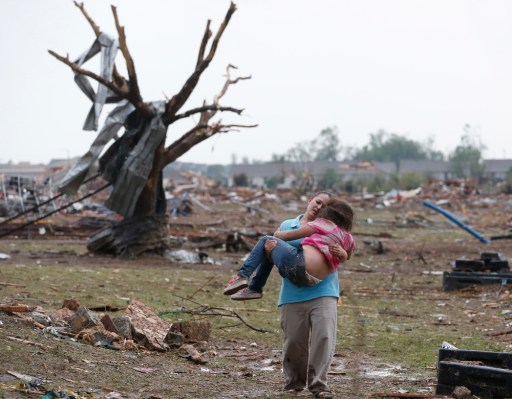
Like most tornados, the storm that tore through Moore, Okla. on May 20 arrived with little advance notice. Though forecasters knew the conditions were present for a potentially dangerous twister, it wasn’t until 2:40 p.m. that the National Weather Service issued its most serious warning: a “tornado emergency.” 16 minutes later, the storm barrelled through the Oklahoma City suburb, flattening homes, whipping cars into the air and collapsing an elementary school to rubble. By the time it ended, 24 people were dead, including nine children. But as so often happens in moments of crisis, the storm brought out the best in people. Teachers threw their bodies over students as the elementary school caved in and residents and first-responders rushed to dig their neighbors out of the rubble. “You hear screams,” one of those residents, Brandon Moore, told TIME, “you go help.” —Ben Goldberger
9. The IRS Overreaches
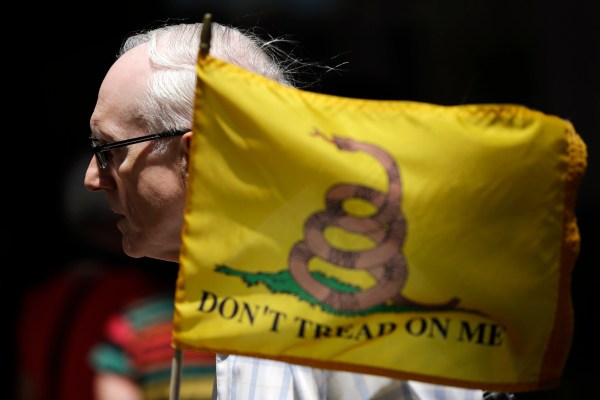
When a report surfaced in May that the IRS was targeting nonprofits with words like “Tea Party” in their name for increased scrutiny, it looked, momentarily, like President Obama was facing a major political scandal. Within days, the IRS’ acting commissioner resigned and Republicans were calling for Obama’s impeachment. But things didn’t unfold as expected. Obama maintained he had no knowledge of the policy, and it soon became clear that the IRS also targeted liberal groups seeking nonprofit status. Instead, the revelations served as a reminder of the bureaucracy’s potential to overstep its bounds and spurred an internal review that found ongoing malpractice within the agency. —Noah Rayman
8. Gun Control Loses Steam
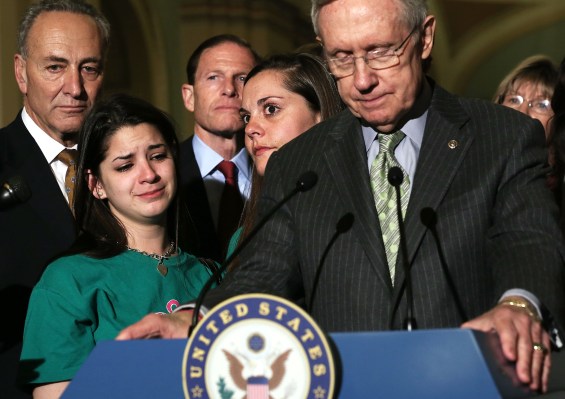
The horrific school shooting in Newtown, Conn. that left 20 children and six adults dead was supposed to have been a turning point for gun control advocates. Riding the collective dismay over the massacre, Democratic Congressional leaders sought to ban assault weapons and high-capacity magazines and expand background checks on gun sales. Despite President Obama throwing the full weight of his bully pulpit behind the effort, the bill failed in the Senate in April, with 45 Senators — including four democrats — voting against it. A rough year for gun control advocates got even worse in September when gun rights supporters waged an effort to recall two Colorado state senators who supported state-wide measures expanding background checks. As the National Rifle Association and gun control activists like New York City Mayor Michael Bloomberg poured money into the campaign, the vote became a proxy battle for the larger national fight. When the votes were counted in favor of the recall, TIME wrote, “any wind still left in the sails of gun control advocates likely died—at least for now.”—Noah Rayman
7. Detroit Files for Bankruptcy
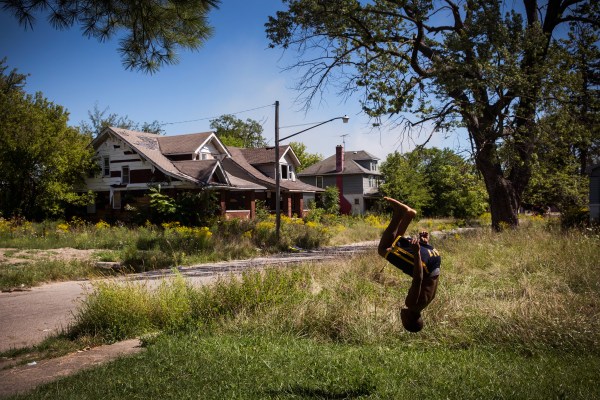
After years of population losses and mounting debt, Detroit filed for bankruptcy on July 18, becoming the largest city in U.S. history to hit the reset button. The move was an acknowledgement that the Motor City, once the richest in America, was incapable of digging itself out from an $18 billion hole. “The 2009 bailouts may have revived the carmakers,” TIME wrote after the filing, “but they haven’t saved the city.” To some residents, especially municipal workers and retirees who stand to have their pensions cut, declaring bankruptcy amounted to a particularly embarrassing surrender for a once-mighty city. But to supporters, settling with creditors and restructuring nearly $3.5 billion in unfunded pension obligations was seen as an essential step to restoring financial solvency and, as Michigan Governor Rick Snyder said the day of the filing, make a “fresh start” without “burdens of debt it cannot hope to repay.” The bankruptcy also served as a wake-up call to municipalities across the country struggling with their own shaky finances. They’ll be watching closely as Detroit attempts to turn its historic collapse into a model of urban recovery. —Noah Rayman
6. George Zimmerman Acquitted
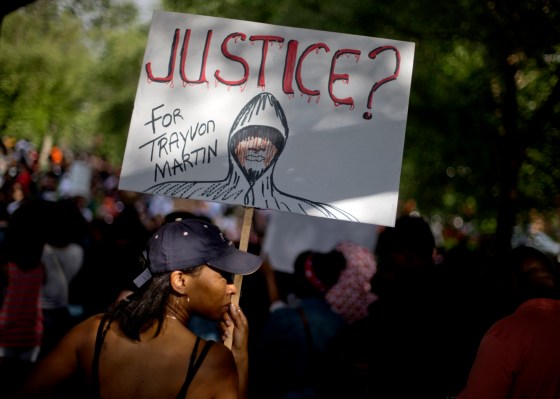
By the time George Zimmerman was charged with second-degree murder in April of 2012, the small-town altercation had already become a major national story. Only the basic facts were clear: Zimmerman, a neighborhood watch volunteer, shot and killed Trayvon Martin, an unarmed 17-year-old African American, after a confrontation in the Florida neighborhood he patrolled. Zimmerman maintained he acted in self-defense, while Martin’s supporters saw it as an example of racial profiling played out to a deadly end. On July 13, after two days of deliberations, the jury delivered its verdict: not guilty on all charges. The decision settled the criminal charges, but it did little to address the larger issues about race and the justice system the case raised. The verdict, TIME noted, “may do little to satisfy a country at the intersection of demographic change that promises a new chapter and ancient divisions that refuse to heal.” —Noah Rayman
5. The Federal Government Shuts Down
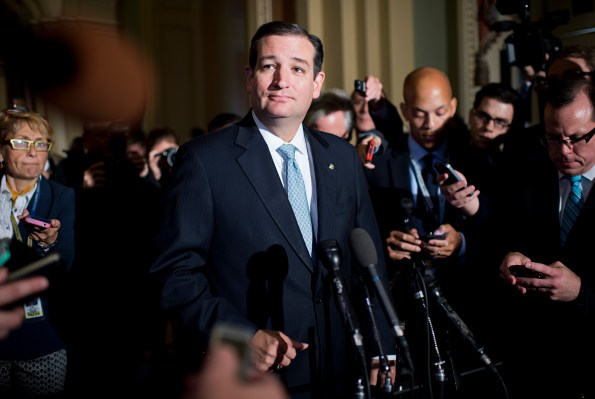
Unable to reach agreement on federal spending levels, a dysfunctional Congress stumbled into the first government shutdown since the mid-1990s, grinding much of the federal bureaucracy to a halt for more than two weeks in October. The showdown was forced by a cadre of conservative Republicans, who sought to tie government funding to a bill to gut the Affordable Care Act. The 16-day impasse, which ended with a short-term deal that averted a debt default, torpedoed Republican approval ratings, slowed economic growth and ultimately cost some $24 billion, according to the credit agency Standard and Poor’s. While the political and economic fallout should prevent a repeat when funding deadlines expire in early 2014, the episode may have long-term ramifications. Moderate Republicans and business lobbies aligned with the GOP vowed to take a more aggressive posture against the Tea Party conservatives who spurred the shutdown, setting up a battle for the soul of the party that will define the 2014 midterm elections. —Alex Altman
4. The Supreme Court Finds for Gay Marriage
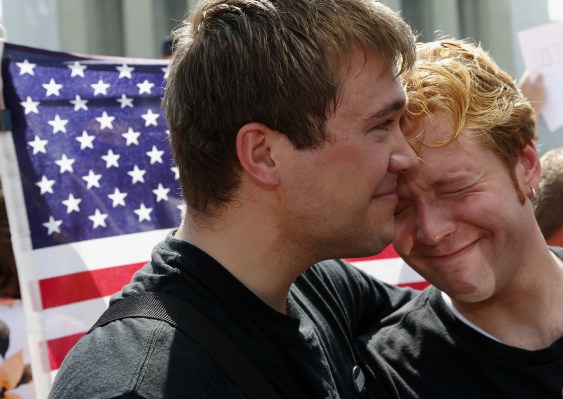
On June 26, the Supreme Court made official what may be the fastest shift on a civil rights issue in the nation’s history. In a landmark 5-4 decision, the high court struck down the federal law defining marriage as between a man and a woman, clearing the way for gay marriage throughout the U.S. Writing for the majority, Justice Anthony Kennedy framed the decision as a matter of basic equality. The Defense of Marriage Act, Kennedy wrote, “undermines both the public and private significance of state-sanctioned same-sex marriages; for it tells those couples, and all the world, that their otherwise valid marriages are unworthy of federal recognition.” In a separate case, the court dismissed an appeal to uphold California’s ban on same-sex marriage, thus allowing gay marriage to resume in the Golden State. Minnesota, Rhode Island, Hawaii and Illinois have since followed suit and legal challenges of same-sex marriage bans are pending in other states. The rulings marked an astonishingly rapid social evolution. Just 17 years earlier, President Bill Clinton signed DOMA into law with widespread support from both parties. At the time, no state allowed same-sex marriage. By 2013, 12 states and the District of Columbia allowed them and Clinton, Barack Obama and many other prominent politicians had reversed their earlier opposition. When the court ruled that same-sex couples are no different under the law, it was merely keeping pace. —Ben Goldberger
3. Obamacare’s Bungled Rollout
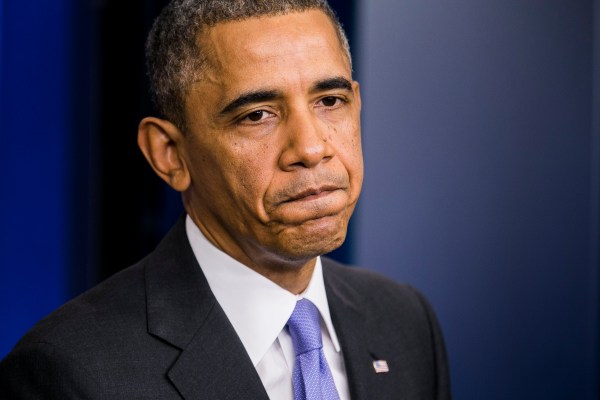
The passage of the Affordable Care Act may have been President Barack Obama’s greatest triumph, and its roll-out his greatest failure. The Oct. 1 launch of the federal website for purchasing private insurance coverage through a government-operated exchange was an unmitigated disaster. A combination of technical glitches, high demand and faulty coding rendered healthcare.gov barely usable for its first month of operation. By the end of October, less than 2% of the 7 million Americans government officials hope to enroll in Obamacare by the end of 2014 had signed up. The President didn’t help his own cause when his promise that anyone who liked their current health plan could keep it proved to be untrue. The fallout has been substantial: Obama’s popularity hit an all-time low as voters disapproved not just of his performance but also of his personal credibility. As his administration races to fix the broken website, the fate of its signature domestic achievement – and potentially, Obama’s legacy — hang in the balance. —Noah Rayman
2. The Boston Marathon Bombing

When two pressure cookers exploded near the finish line of the Boston Marathon on April 15, the blast killed three people, injured more than 260 others, and put an entire nation on edge. The bombs — a crude mix of nails and shrapnel that tore through the crowd of cheering spectators, volunteers and proud, almost-finished runners — instantly transformed a moment of shared joy into one of collective terror. On April 17, the FBI sought the public’s help in identifying grainy surveillance images of two young men thought to be the perpetrators. The search took a violent turn just hours later when brothers Dzhokhar and Tamerlan Tsarnaev allegedly shot and killed an MIT police officer and then exchanged fire with police as they tried to escape in a hijacked SUV. Tamerlan, 26, was killed in the fracas; his younger brother, Dzhokhar, 19, managed to escape. As day broke April 18, state officials shut down Boston area public transit and urged residents to “shelter in place” behind locked doors, effectively paralyzing a major American city. Police ultimately found a bloodied and dazed Dzhokhar hiding in a small boat, in which he allegedly wrote pro-Islamist messages with his own blood. He has pleaded “not guilty” to 30 charges related to the bombing, including 17 punishable by death. —Noah Rayman
1. The Snowden Leaks

On June 6, the Guardian and the Washington Post broke the first stories in a series that would expose extraordinary surveillance at home and abroad by the U.S. National Security Agency in arguably the most important leak of classified intelligence ever. The stories initially detailed the NSA’s program of bulk data collection of Americans’ phone and internet records, but soon exposed U.S. spying against allies and other more traditional espionage targets abroad. NSA-contractor Edward Snowden revealed from Hong Kong that he had handed over hundreds of thousands of documents to reporters, and said he was doing so to prevent the establishment of “turn-key tyranny” in America. The ensuing revelations and Snowden’s flight to Russia infuriated the Obama administration, which sought his extradition on criminal charges. They also embarrassed the intelligence community and initiated an international discussion on the boundaries of surveillance in this age of instant communication. —Massimo Calabresi
Think we missed something? Tell us using hashtag #TIME2013
Follow @TIME


